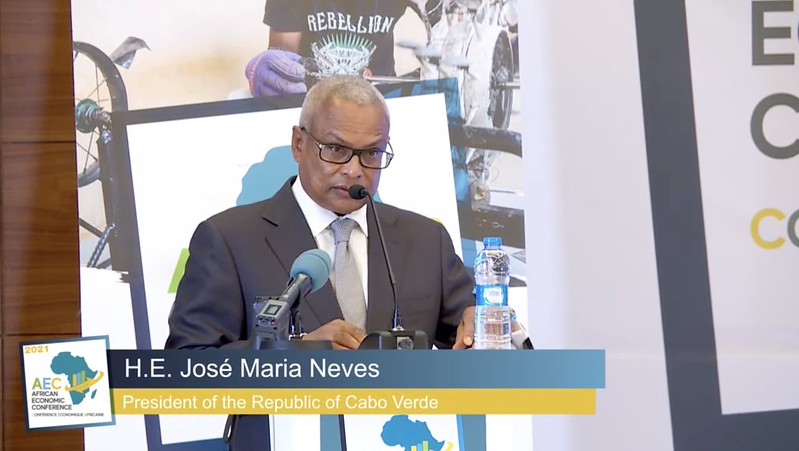Cape Verdean President joins calls for universal COVID-19 vaccines access as Omicron spreads

As a new COVID-19 variant, Omicron ravages the world, at a time some form of normalcy was returning to the world after a year of squaring off with the pandemic, vaccination in Africa is still the lowest, compared to other continents such as the Americas and Europe.
According to the World Health Organisation (WHO), just five African countries, less than 10 per cent of Africa’s 54 nations, are projected to attain the year-end target of fully vaccinating 40 per cent of their citizens.
Three African countries, Seychelles, Mauritius and Morocco, have already met the goal that was set in May by the World Health Assembly, the world’s highest health policy-setting body. At the current pace just two more countries, Tunisia and Cape Verde, will also hit the target, it added.
At the opening of the African Economic Conference in Sal, Cape Verde, the island state’s President, José Maria Neves has joined the development community to call for urgent universal vaccine access to tackle the potential impact of Omicron and other variants of the COVID-19 virus on Africa. In addition to unavailability of vaccines, African countries are also facing a shortage of the appropriate syringes for administering the vaccines.
The WHO has indicated that there is no global stockpile of the 0.3ml specialized syringes, which differ from the 0.5ml syringes used for other types of COVID-19 vaccines and routine vaccination. The market for 0.3ml auto-disable syringes is tight and extremely competitive. As such, these are in short supply and will remain so through at least the first quarter of next year.
In a press release copied to Ghana Business News, the organisers of the conference indicated that the WHO has categorized Omicron as a ‘variant of concern’, pointing to the fact that it could be more contagious than other known variants.
“We must act to manufacture our own vaccine and medicines to face this and other pandemics to come. We must find innovative mechanisms for financing and managing sustainable development, otherwise we will disappoint young Africans.
“The fight against the COVID-19 pandemic, besides being internal to each country, is at the same time a global fight, which requires global collaborative solutions. Everyone wins if the less developed countries have the necessary conditions to overcome this serious health, economic and social crisis and to leverage their sustainable development,” Neves told participants at the 2021 African Economic Conference. He added that the world may have to live with the virus for a while.
The 2021 edition of the African Economic Conference is being held in a hybrid format in Sal, Cape Verde, and online. Participating are a wide range of stakeholders, including policymakers, development institutions, the private sector, and researchers, who would discuss ways to sustainably grow the Africa’s development funding sources.
“It is hitting all countries without exception, hence this conference organized with the support of the African Development Bank, the United Nations Development Programme, and the Economic Commission for Africa, could not have come at a better time,” Rui Figueiredo Soares, Cape Verde Foreign Affairs Minister said.
In his remarks, Antonio Pedro, Deputy Executive Secretary at the Economic Commission for Africa, warned: “Failure to address the pandemic through universal access to vaccines will spawn more resilient and potent variants, threatening the global effort to fight the virus. The recent emergence of the Omicron variant of the COVID-19 virus illustrates my point.
“The possibility of new and more virulent variants, coupled with imminent climate shocks, calls for a more coordinated global response to the pandemic, backed by bold and innovative financing mechanisms,” Pedro added, attributing the emergence of the Omicron variant to “an uncoordinated global response to the pandemic.”
In a video message, Amina Mohammed, UN Deputy Secretary General, stated that vaccine inequality could cost African countries billions of dollars. “Africa cannot recover from the pandemic alone, we need global solidarity,” she said.
UN Under-Secretary General and Administrator of the United Nations Development Programme, Achim Steiner said: “We need urgent cooperation from vaccine manufacturers and vaccine-producing countries and countries with high vaccination rates to tackle this acute vaccine supply shortage. Doing so will help to open up economic and social opportunities across the continent, boosting GDP and driving forward economic recovery.”
“We are seeing…worrying signs of an uneven global economic recovery…Countries across Africa need new access to finance and debt relief measures, innovative financing solutions as well as more tailored support to transition to a green economy as well as the potential to leverage digital technology to address acute development challenges,” he added.
Kevin Urama, Acting Chief Economist and Vice-President at the African Development Bank, said the Bank stood ready to support African countries as they rebuild their economies.
By Emmanuel K. Dogbevi
Copyright ©2021 by NewsBridge Africa
All rights reserved. This article or any portion thereof may not be reproduced or used in any manner whatsoever without the express written permission of the publisher except for the use of brief quotations in reviews.
